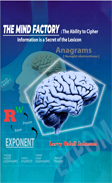
 |
The Mind Factory: The Ability to Cipher Information is a Secret of the Lexicon
by Larry Odell Johnson
At the root of all things in the cosmos is the word. The power of language, when observed astutely and from the right lens, is exponential and harbors the ability to reign in everything from religion and philosophy to mathematics and sociology. Through a combination of personal experiences and meticulous research, Johnson provides tools to observe how language is a universal connector that can decipher life’s greatest complexities.
On the surface, the author seeks to take arcane and esoteric language and make it more comprehensible for his audience. Digging deeper, though, the intrigue factor is heightened when readers get to see Johnson break down his insights on something as iconic as E=MC^2 into an anagram that reveals its own story. While this doesn’t have the same breakneck pace and adventure of a Dan Brown novel, the mystery adds to the allure, and the author is determined to help his readers uncover the mysteries that lie untouched around them, waiting to be unearthed.
The constant prodding from various perspectives, such as the philosophical and sociological perspective, creates a thought-provoking experiment on whether our everyday reality is, in fact, real. And if so, how do we know that? From in-depth references to the all-in-one scientist, philosopher, and mathematician in Leibniz and Enlightenment philosopher Immanuel Kant to analyzing words of Sigmund Freud and the works of Einstein, the author lays out his understanding of the world in crystal-clear fashion and is undoubtedly unafraid to share his findings. Thus, the author’s premise is to demonstrate and, as he states, “normalize” the use of anagrams and cryptography when interpreting texts within the fields of theology (e.g., the Bible), mathematics, etc., that are rooted in historical documentation. There is a specific system that can be proven to be scientific, lending credence and validity to its overall use.
While the work is separated into six chapters, it is Chapter Four that is the essence of Johnson’s work, one that sheds light on the deep powers of the anagram and symbolism. Perhaps what makes the work that much more compelling is the author’s ability to examine microscopic details and work on unraveling their meaning. For instance, in a famous Einstein quote, the word “fairest” in “the fairest thing we can experience is the mysterious” is dissected and studied from all vantage points. This research leads him to encryption and ciphering strategies, concluding that whether it is induction proofs in mathematics or the hieroglyphics of the great pyramids, the purpose is for audiences to analyze that which has already been laid out for them.
Above all else, the direct universal relevance that arises from ciphering the hidden meaning constantly disseminates valuable information. Within this realm, Johnson dives into topics of generational curses and what ultimately confines human beings to live a largely status-quo life devoid of mysteries and exciting adventures. As one mulls over the various examples and topics that span the biblical to philosophical, it becomes increasingly evident that this work, at its core, seeks to simply teach us how to think and how to positively use the most powerful tool handed to us by nature. Whether directly or vicariously, we are present in the human story, evidenced best by ciphering through rap lyrics and contemporary songs. Despite tackling intricate topics, Johnson does a commendable job in making the process easier for audiences to discern and interpret while still retaining its original value.